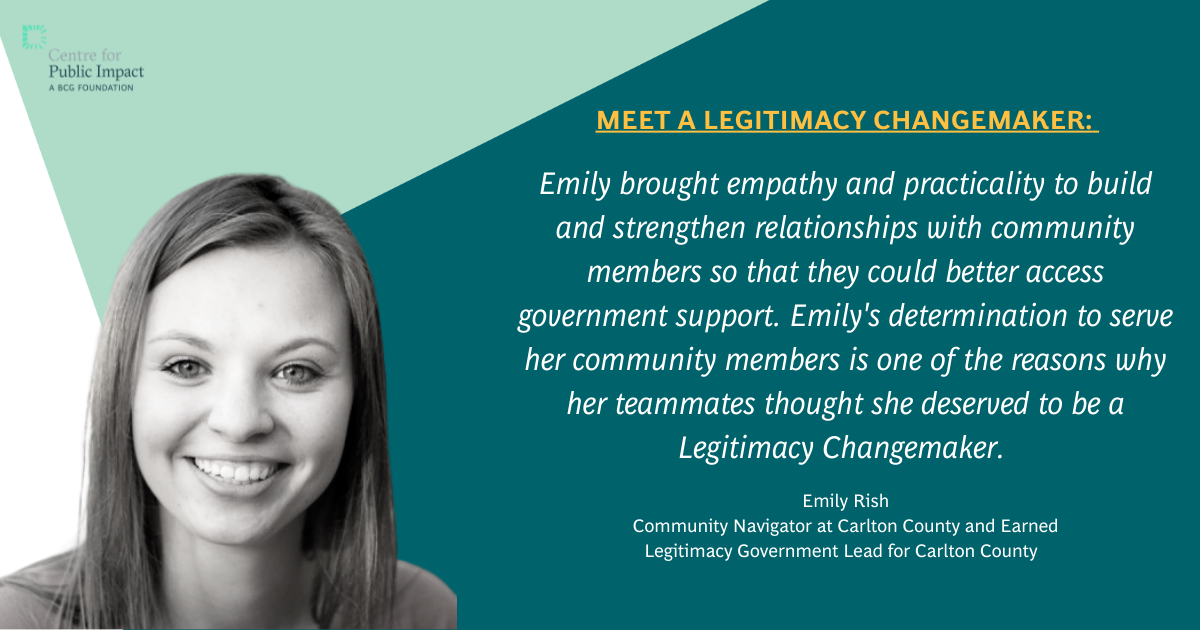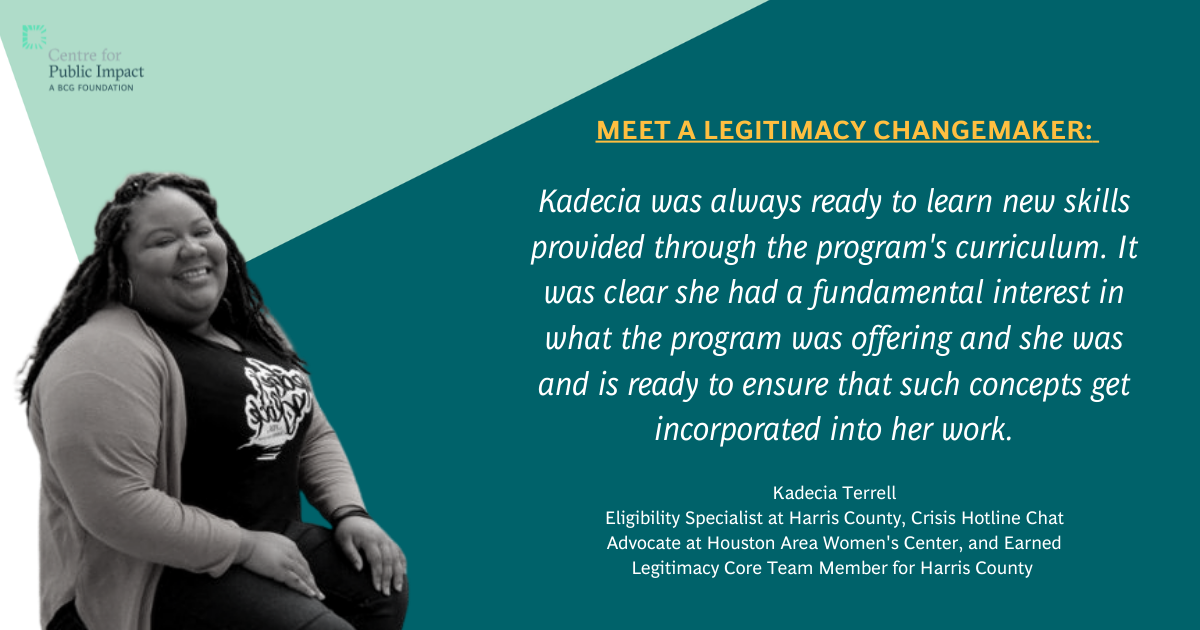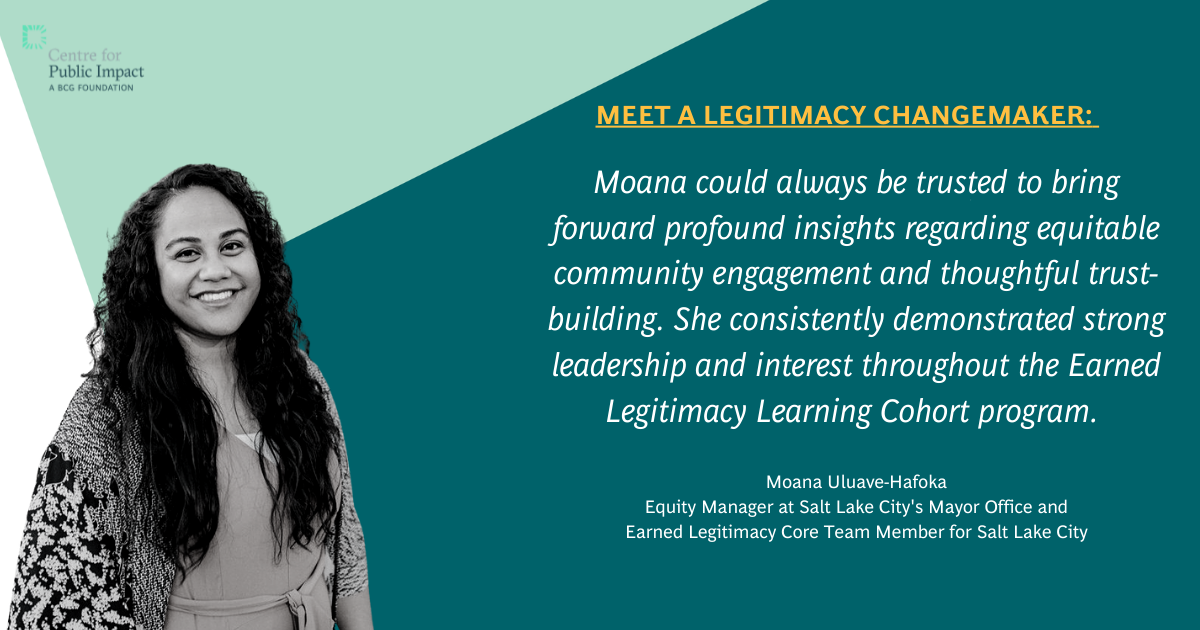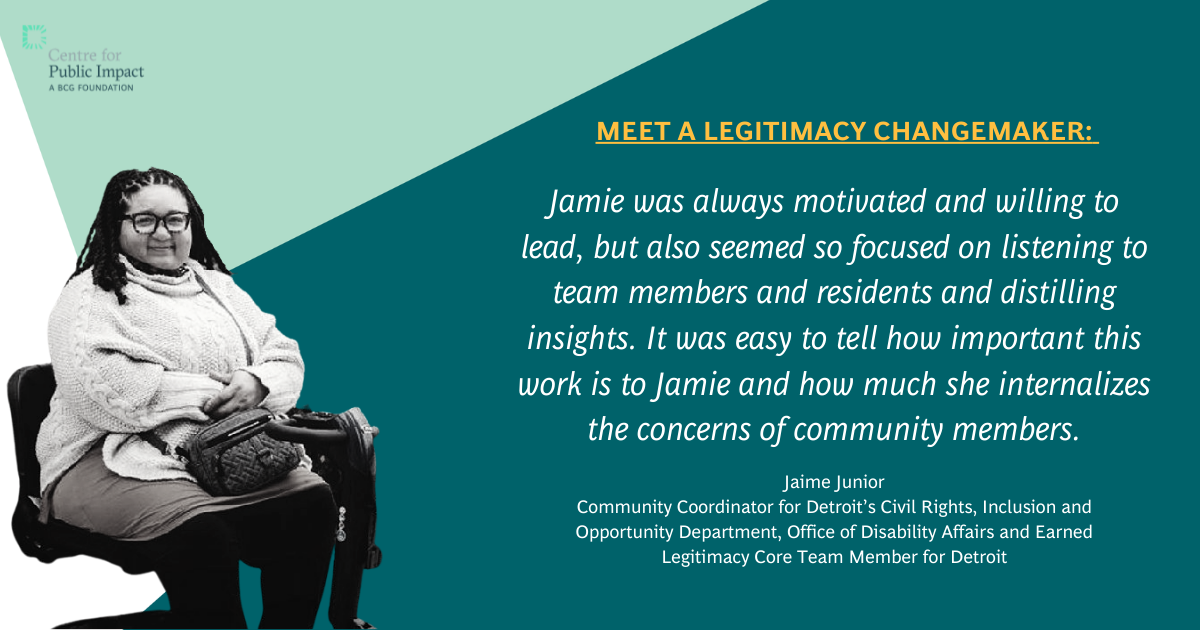

Legitimacy Changemakers: Government workers who inspire hope for a better relationship with community
Article highlights
How can public institutions be effective if they’re not trusted? How might governments earn legitimacy so they can effectively serve communities? @CPI_foundation shares insights from the Earned Legitimacy Learning Cohort
Share article.@CPI_foundation spotlight 🔦 inspiring leaders from @CarltonCountyMN @CityofDetroit @HarrisCountyCSD @SLCOEI who demonstrate how governments can work with residents to earn legitimacy
Share article"Our goal was to strengthen relationships between local govts & communities, particularly marginalized communities who have been negatively affected by govt itself." @CPI_foundation on the Earned Legitimacy Learning Cohort
Share articlePartnering for Learning
We put our vision for government into practice through learning partner projects that align with our values and help reimagine government so that it works for everyone.
How can our public institutions be effective if they’re not trusted by the people they aim to represent? How might governments earn legitimacy so that they can more effectively serve communities? While these are complex questions with no easy answers, we at the Centre for Public Impact gained some insight from local government and community leaders in our Earned Legitimacy Learning Cohort. We wanted to spotlight a few of the inspiring leaders we met who demonstrate how governments can work tirelessly with their residents to earn legitimacy. We call these people our “Legitimacy Changemakers.”
"Our goal was to strengthen the relationship between local governments and their communities, particularly marginalized communities who have been negatively affected by the government itself in the past."
Throughout the Earned Legitimacy Learning Cohort, we worked with local governments across the country, with core teams in Carlton County, MN; Detroit, MI; Harris County, TX; and Salt Lake City, UT. Our goal was to strengthen the relationship between local governments and their communities, particularly marginalized communities who have been negatively affected by the government itself in the past. Two of the themes that repeatedly came up across this diverse range of places include:
The power of hope. While we heard government and community leaders alike express negative emotions, such as frustration, anger, and disappointment, there was a positive feeling that consistently emerged: hope. When engaging and sharing power with communities, feelings of hope inspired collaborative action.
Humanizing and demystifying government: When local governments take innovative approaches to equitably engage communities, residents gain a deeper understanding not just of the institution of government, but of the people who make it possible. We found that this human connection can help build healthier relationships between civil servants and community members.
By spotlighting this group of Legitimacy Changemakers, we hope to grow these themes beyond our initial Cohort, inspiring hope and humanizing government workers passionate about serving their communities. These changemakers were nominated by other Cohort members based on how they embraced a set of values core to earning legitimacy, including:
Equity: Committing to taking measures to ensure everyone has access to the same opportunities and striving to correct systemic imbalances
Open-mindedness: Being non-judgemental, intentionally seeking out perspectives different than your own and embracing failures as opportunities to learn and grow
Humility: Recognizing your limitations, not positioning yourselves as the expert or holder of all knowledge, and admitting when you are wrong
Accountability: Being liable to the communities who you intentionally center throughout your work and being willing to accept responsibility for actions that impact them
Curiosity: Embracing a growth mindset, intentionally testing your assumptions and being open to adaptation based on what you learn
WIthout further ado, our Legitimacy Changemakers are Emily Rish, Kadecia Terrell, Moana Uluave-Hafoka, and Jaime Junior. Of the 42 members of the Earned Legitimacy Learning Cohort that we had the great privilege to learn from, Cohort members agreed that these four incredible leaders most embraced the values of earned legitimacy. We hope they can serve as examples for those working to reimagine government so it can work better for everyone.
Emily Rish
Community Navigator at Carlton County and Earned Legitimacy Government Lead for Carlton County

As the Community Navigator in Carlton County’s Community & Family Initiatives Department, Emily knew the services, programs, and resources the County offered. However, she also knew that many residents weren’t able to access these opportunities because of a lack of awareness, a sense of pride, distrust in government, or some combination of all these.
Through the community engagement opportunities in our program, Emily brought empathy and practicality to build and strengthen relationships with community members so that they could better access government support. She coordinated logistics to ensure community members felt like they could contribute in listening and ideation sessions, and then worked with the core team to practically organize the insights into actionable recommendations the county board ultimately approved.
Emily’s teammates recognized her compassion, persistence, and ability to rally Cohort and community members of all backgrounds in a way that was respectful and inspired hope.
Kadecia Terrell
Eligibility Specialist at Harris County, Crisis Hotline Chat Advocate at Houston Area Women’s Center, and Earned Legitimacy Core Team Member for Harris County

With regards to program participation, Kadecia was consistently present and engaged throughout the Cohort experience. From the very beginning of the program, she demonstrated an excitement around the content and the tools that would be central to the work. For example, Kadecia quickly became a teacher for the Harris County team on how to utilize Miro (the digital collaboration tool we used in the program).
Kadecia was a key team leader because of her involvement with resident interviews, her thoughtful questions during core team meetings, and eventually her decision to present the team’s capstone project to Commissioners Court with fellow team member, Jon Garcia. She was committed to ensuring that the team’s work would be shared with the broader Harris County community and that the earned legitimacy themes would reverberate throughout her local government.
Kadecia’s teammates recognized her fundamental interest in building trust with residents, her creativity in incorporating concepts into her work, and her tireless commitment to making government work better. You can learn more about Kadecia’s experience by reading her article: “Hope of Co-Creating in Harris County”.
Moana Uluave-Hafoka
Equity Manager, Salt Lake City Office of the Mayor

Moana was an essential team member for Salt Lake City. As the Equity Manager within the Office of the Mayor, Moana could always be trusted to bring forward profound insights regarding equitable community engagement and thoughtful trust-building.
She was a key team member responsible for inviting residents to the community listening sessions and also volunteered to be the lead facilitator for the community co-creation session. Moana consistently demonstrated strong leadership and interest throughout the program, which inspired her fellow teammates to follow suit.
Moana’s teammates recognized her ability to step up and support others in advancing priorities, along with the intention she brought to centering equity in their work.
Jaime Junior
Community Coordinator for Detroit’s Civil Rights, Inclusion and Opportunity Department, Office of Disability Affairs and Earned Legitimacy Core Team Member for Detroit

Jaime was an incredibly active member who came into the program focused on ensuring that community voices would be heard and prioritized. Early in workshops, she shared how imperative it is for public officials to be engaging with residents directly because “sometimes our most marginalized residents are so busy surviving that they might not have the time to adequately advocate for themselves.”
She made sure the team prioritized community voices by playing an active role in supporting recruitment efforts for the resident interviews and community ideation session. After our program ended, Jaime has continued to be an advocate for community voices by hosting additional community listening sessions to gain residents' perspectives as the city moves forward with their Disability Access Strategic Plan.
Jamie’s teammates recognized her ability to motivate and lead the team, while also bringing an empathetic approach to listening deeply to community members and acting upon insights community members shared.
Authors: Naja Nelson, Brian Zuluaga, John Burgoyne, Alejandra Montoya, Jorge Fanjul
Learn more about Earned Legitimacy
Are you interested in reading more about the progress and developments of the Earned Legitimacy Learning Cohort?
You may also be interested in...


Carlton County, Minnesota; Detroit, Michigan; Harris County, Texas; and Salt Lake City, Utah take action to address past harms and rebuild legitimacy with marginalized communities
